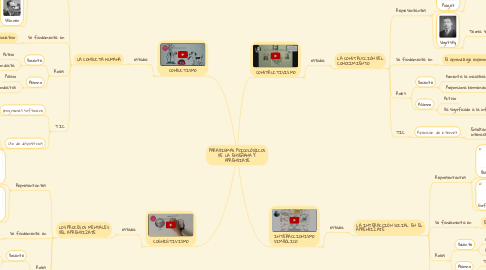
1. CONDUCTISMO
1.1. estudia
1.1.1. LA CONDUCTA HUMANA
1.1.1.1. Representantes
1.1.1.1.1. Paulov
1.1.1.1.2. Skinner
1.1.1.2. Se fundamenta en
1.1.1.2.1. El aprendizaje asociativo
1.1.1.3. Roles
1.1.1.3.1. Docente
1.1.1.3.2. Alumno
1.1.1.4. TIC
1.1.1.4.1. programas software
1.1.1.4.2. Uso de dispositivos
2. COGNIGTIVISMO
2.1. estudia
2.1.1. LOS PROCESOS MENTALES DEL APRENDIZAJE
2.1.1.1. Representantes
2.1.1.1.1. Ausubel
2.1.1.1.2. Bruner
2.1.1.2. Se fundamenta en
2.1.1.2.1. El aprendizaje adaptativo
2.1.1.3. Roles
2.1.1.3.1. Docente
2.1.1.3.2. Alumno
2.1.1.4. TIC
2.1.1.4.1. Enseñanza asistida por ordenador (EAO)
3. CONSTRUCTIVISMO
3.1. estudia
3.1.1. LA CONSTRUCCIÓN DEL CONOCIMIENTO
3.1.1.1. Representantes
3.1.1.1.1. Piaget
3.1.1.1.2. Vigotsky
3.1.1.2. Se fundamenta en
3.1.1.2.1. El aprendizaje experimental
3.1.1.3. Roles
3.1.1.3.1. Docente
3.1.1.3.2. Alumno
3.1.1.4. TIC
3.1.1.4.1. Aparición de internet
4. INTERACCIONISMO SIMBÓLICO
4.1. estudia
4.1.1. LA INTERACCIÓN SOCIAL EN EL APRENDIZAJE
4.1.1.1. Representantes
4.1.1.1.1. Blumer
4.1.1.1.2. Goffman
4.1.1.2. Se fundamenta en
4.1.1.2.1. El aprendizaje colectivo
4.1.1.3. Roles
4.1.1.3.1. Docente
4.1.1.3.2. Alumno
4.1.1.4. TIC
4.1.1.4.1. interactividad

